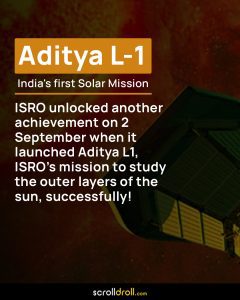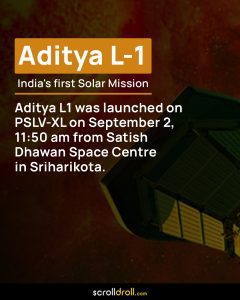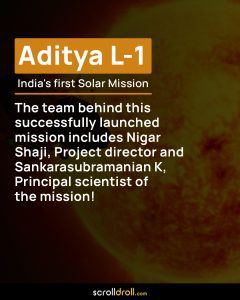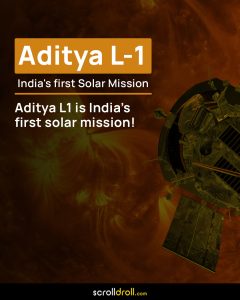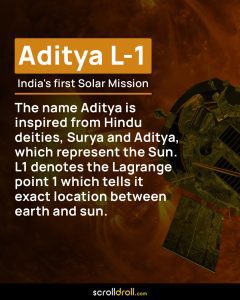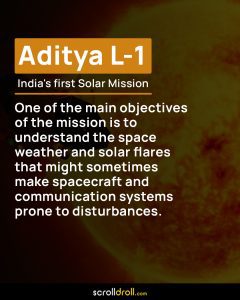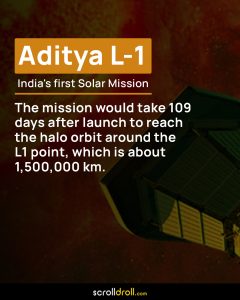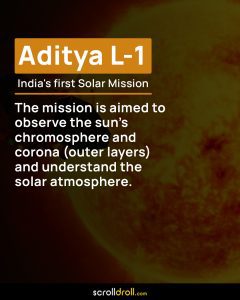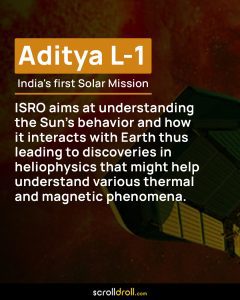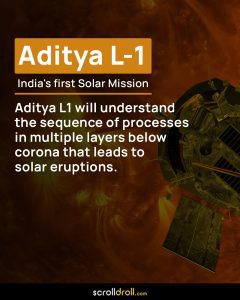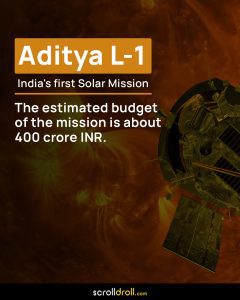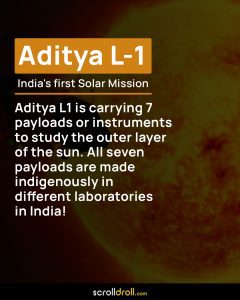We were just reeling from the exciting news of Chandrayaan-3’s successful lander mission on Moon when ISRO gave us another reason to be proud of its Aditya L1 mission. Aditya-L1 is a satellite dedicated to the comprehensive study of the Sun. It has 7 distinct payloads developed, all developed indigenously. The Sun is a giant sphere of gas and Aditya-L1 would study the outer atmosphere of the Sun. Aditya-L1 will neither land on the Sun nor approach the Sun any closer.
The Launch
The Indian Space Research Organization successfully launched Aditya L1 aboard a Polar Satellite Launch Vehicle or PSLV-XL. The rocket is sent using orbiter maneuvering which means Aditya L1 will stay in Earthbound orbits for 16 days until it gains velocity to be able to complete its journey. This is the same technique that was used for the Mars Orbiter Mission (MOM) and Chandrayaan-3 while launching.
About Aditya L1
Aditya L1 is the first Indian space mission dedicated to observing the Sun. The mission is aimed at studying the atmosphere around the Sun and the outer layers of it. The mission was launched under project director Nigar Shaji’s leadership.
The Aditya mission was conceptualised in January 2008 by the Advisory Committee for Space Sciences (ADCOS). Initially, it was supposed to be a small satellite with a coronagraph to study solar corona but it was expanded into a comprehensive solar and space environment observatory.
The spacecraft will remain in the halo orbit for its planned mission duration. The strategic location of the satellite enables Aditya-L1 to continuously observe the Sun without being hindered by eclipses or occultation, allowing scientists to study solar activities and their impact on space weather in real-time.
Aims and Objectives of the Mission
The mission is aimed to observe the dynamics of the Sun’s chromosphere and corona. One of the main questions in solar physics is why the corona is much hotter than the Sun’s surface. Aditya L1 will study the details of the corona’s dynamics and composition which might unravel the answer to this puzzle.
The solar satellite has instruments like Magnetometer that will help scientists to understand the interplanetary magnetic field. This in turn will help in observing how it interacts with Earth’s magnetosphere and give a clearer view of space weather.
It is very crucial to understand the Sun’s behavior to accurately predict space weather that has a significant impact on Earth’s space technology and infrastructure. Aditya L1 will accurately understand the solar weather that can help understand the space climate.
The mission’s data will provide insights into the processes that lead to solar flares, coronal mass ejections (CMEs), and solar energetic particle (SEP) events. It is important to forecast these events as it might hamper the functioning of satellites and communication systems.
Budget for Aditya L1
It was made on a budget of 400 crores INR which is less than most of the Bollywood movies nowadays. One reason why such a low budget could work is because of the method used by ISRO for launching its rockets in space. ISRO uses the orbiter maneuvering technique where the spacecraft is basically shot into outer space like a slingshot after it acquires the required velocity. This way the rocket consumes less fuel and still completes its journey. Another reason could be making all the payloads indigenously in India and not importing them from other countries.
Instruments in Aditya L1
There are seven payloads on this solar rocket- four for remote sensing and 3 for in situ observation of the Sun. All were made in different labs in India itself. These four that will be used for remote sensing will make observations like sun-as-a-star and also be used for solar imaging. The in situ payloads will study the atmosphere and solar wind interaction with space particles.
The mission has just launched but this is still a great feat for India, a country which was under colonizers just a few decades ago. To have an active space program is a matter of pride for all of us. All the best Aditya L1! May you successfully complete your journey! Bon Voyage!


